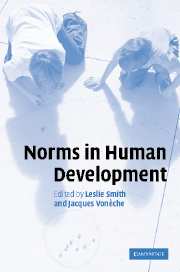Book contents
- Frontmatter
- Contents
- List of figures
- List of tables
- List of contributors
- Acknowledgments
- 1 Norms in human development: introduction
- Part I Norms and development in epistemology
- 2 The implicit normativity of developmental psychology
- 3 Developmental normativity and normative development
- 4 Genetic epistemology: naturalistic epistemology vs normative epistemology
- 5 Norms and normative facts in human development
- Part II Norms in moral and social development
- Part III Norms in cognitive development
- References
- Index
5 - Norms and normative facts in human development
Published online by Cambridge University Press: 22 September 2009
- Frontmatter
- Contents
- List of figures
- List of tables
- List of contributors
- Acknowledgments
- 1 Norms in human development: introduction
- Part I Norms and development in epistemology
- 2 The implicit normativity of developmental psychology
- 3 Developmental normativity and normative development
- 4 Genetic epistemology: naturalistic epistemology vs normative epistemology
- 5 Norms and normative facts in human development
- Part II Norms in moral and social development
- Part III Norms in cognitive development
- References
- Index
Summary
The chess board is the world, the pieces are the phenomena of the universe, the rules of the game are what we call the Laws of Nature.
(Huxley, 1868)Norms are not part of the intrinsic nature of things, which is entirely indifferent to them. They are imposed by the will of intelligent beings [who] can act according to a conception of them.
(Brandom, 1994)Normativity and developmental psychology
Modern psychology is not distinctive because of its investigation of the mind – Aristotle's De anima set out to do that two millennia ago – but rather because of its empirical investigation of the mind. This leads to two problems, one about normativity, and the other about development.
Normativity
During the nineteenth century, psychology became the science of the mental world, and was regarded as comparable to physics. The causal relations in these domains are empirically investigable, leading to laws of nature in physics, and to laws of the mind in psychology. These psychological laws were also called laws of thought. Yet this parallel between physical and psychological laws is problematic. The minefield between science and philosophy has well-known and still unresolved flashpoints, including problems about mind–body relationships (Descartes, 1931; Nagel, 1995), about freedom of the will (Kant, 1993; Searle, 2001) and about consciousness in the brain (Aristotle, 1987; Chalmers, 1996).
Normativity is just such a flashpoint. Its importance continues to be acknowledged as fundamental but unresolved.
- Type
- Chapter
- Information
- Norms in Human Development , pp. 103 - 138Publisher: Cambridge University PressPrint publication year: 2006
- 4
- Cited by



